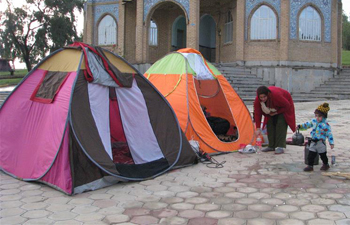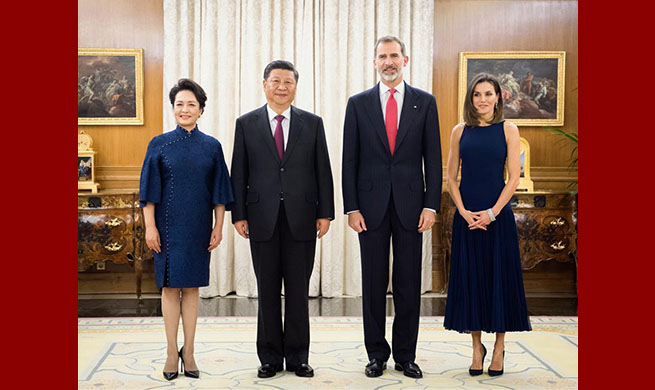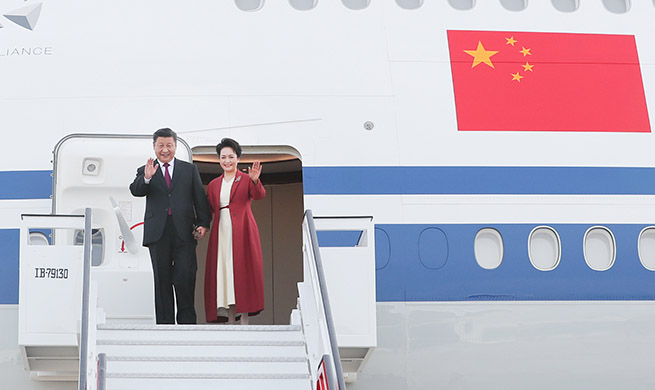TOKYO, Nov. 28 (Xinhua) -- Parliamentary debate began Wednesday in the upper house of parliament on a bill that would open the door to allow more foreign blue-collar workers to work in Japan amid the nation's severe labor shortage.
Japan's ruling bloc a day earlier using its majority in the lower house of parliament, forcibly "bulldozed" the bill through the lower house amid staunch resistance form opposition parties, who believe the bill has not received sufficient debate and gained the understanding of the public.
Prime Minister Shinzo Abe's ruling Liberal Democratic Party (LDP) and its junior coalition partner Komeito are believed to have rammed the bill through the lower house to expedite the process towards its enactment by the end of the ongoing Diet session on Dec. 10.
Abe plans for a new system for foreign workers' residence to begin next April and wanted the talks wrapped up in the lower house as he is leaving on Thursday for the Group of 20 summit in Argentina.
Strong resistance to the bill has been voiced by opposition parties in part because it was only debated for a mere 15 hours and 45 minutes by the lower house Judicial Affairs Committee.
This is far shorter than deliberations on some other contentious bills in recent times.
The previous day, Tetsuro Fukuyama, secretary general of the main opposition Constitutional Democratic Party of Japan (CDPJ), blasted the ruling camp for "bulldozing" the bill through the lower chamber.
"Why on earth did such an empty bill clear the lower house? I can't hide my anger about the ruling bloc railroading it without taking questions," Fukuyama was quoted as saying at a meeting of the party's upper house members.
Other opposition party members have voiced their vexation at the bill being vague and not containing enough details, meaning the details could potentially be decided without further parliamentary debate and pushed forward by ministerial ordinances alone.
While Japan is in dire need of foreign workers to make up the deficit caused by Japan's rapidly aging and shrinking population, opposition party members fear that the lack of detail in the bill could create loopholes through which foreign workers could be exploited.
Lawyers and advocacy groups here following the foreign workers bill have been quick to point out that there have been numerous cases in the past where trainees and laborers have been brought to Japan from overseas on the promise of certain jobs or programs, only to find themselves working in exploitative conditions that infringe on their human rights.
Lower house Speaker Tadamori Oshima, in a near unprecedented move, implored the government on Tuesday to explain the "whole picture" of the foreign workers bill to the Diet prior to the law taking effect.
He said the ruling camp was duty bound to show consideration to the opposition camp's consternation and lack of understanding of the bill's specifics.
The LDP and Komeito, in response to Oshima, agreed that it was important to gain public understanding and cooperation from the opposition bloc.
LDP Diet affairs chief Hiroshi Moriyama said, "It's important to obtain public understanding and cooperation."
The opposition parties, however, finding these words to be hollow, said they would collectively work towards blocking the enactment of the legislation.
CDPJ Diet affairs chief Kiyomi Tsujimoto told a press briefing on the matter that the opposition "seek to scrap the bill."
In Japan, labor shortages are felt most acutely in rural areas and the majority of blue collar workers are expected to be destined for non-major cities. As a result, local governments are nervous that there will not be enough time to prepare for the influx of foreigners to rural areas and believe they will need more time to make sure the workers can adapt to life in Japan smoothly.
Such preparations include providing Japanese language education and medical services.
Under the proposed legislation, the first status involving the new immigration law will allow five-year working visas to foreigners with applicable vocational skills spanning 14 different fields, but they will not be allowed to bring their families.
For foreign workers eligible for the second status, who have more advanced skills, the length of their stay will be open-ended and they will be allowed to bring their families with them.
Japan's top government spokesperson, Chief Cabinet Secretary Yoshihide Suga, previously said that foreigners coming to work in Japan will be treated equally to their Japanese peers and be made to feel comfortable living and working in Japan.
But Japan's largest labor organization Rengo has voiced caution, saying there should be "thorough" debate in the Diet as the immigration shift would have "a major social impact."
Rengo, known officially as the Japanese Trade Union Confederation, also said it is imperative that the government first ensure the rights of foreign workers already working in Japan before widening the doors of immigration.
It, as with lawyers and workers' rights advocates here, also pointed to some cases in Japan where foreign trainees have been forced to work exceedingly long hours, work under dangerous conditions and in roles they were not expecting and have suffered other such work-related abuses.
The government, nevertheless, predicts Japan would accept up to 47,550 foreign workers in the first year from next April and up to 345,150 over five years.













